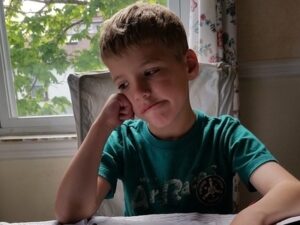There are 2 things that optometrists wish they could yell from the mountaintops for all parents of young school age children to hear:
- Vision screenings at schools and a pediatrician’s office aren’t sufficient to catch more subtle vision issues that make it more difficult for a child to learn.
- These common vision screenings too often lead to a false sense of security that a child’s vision is fine, resulting in a child who struggles with learning and is too often misdiagnosed with a learning problem or disability.
According to the College of Optometrists In Vision Development, one out of four children struggle with reading and learning unnecessarily because of undiagnosed vision problems. In addition, approximately 60% of problem learners have undiagnosed vision problems contributing to their difficulties.
Compounding the problem is that children who are struggling with visual tasks don’t usually recognize that the root cause is with their eyes. All they know is that they’re having a harder time keeping up with tasks like reading, writing, or learning than their peers, which adds to their confusion and frustration.
School and most pediatrician vision screenings typically fail to detect these vision problems because they only test vision with an eye chart, which simply measures how well a child can see at 20 feet.
According to the American Optometric Association, these typical vision screenings miss at least 50% of vision problems in young children because there are as many as 27 visual components that need to be evaluated for a comprehensive exam.
Even if a child can see an eye chart 20 feet away perfectly well, this doesn’t mean he or she doesn’t have issues with the back of the eye or with closer up vision which may affect focusing, coordination, and tracking.
Vision & Misdiagnosis Of ADD Or ADHD
If a child has vision problems that affect focusing, coordination, and tracking, he or she may exhibit symptoms that look similar to ADD or ADHD, such as:
- Poor reading comprehension
- Skipping or rereading lines
- Having a short attention span for close-up work
- Taking longer to do school work
- Often losing their place while reading
- Having difficulty remembering what they just read
In addition, children with undiagnosed vision problems may show symptoms such as:
- Holding learning materials close to their eyes
- Covering one eye
- Tilting their head to one side
- Frequently rubbing their eyes
- Blinking rapidly
- Frequent headaches
- Behavioral issues
At Hardin Valley Eyecare & Optical, Dr. Thompson says, “I’ve seen multiple children who are struggling to learn to read because they have a focusing issue that school screenings did not pick up on. Some kids see double when trying to read and do close-up work because they struggle to bring both eyes into focus on the target.”
In addition, with a common condition called amblyopia, some kids have one eye that is much weaker than the other. This can cause one eye to be out of focus, and as a result that eye doesn’t provide input to the brain so the child isn’t able to see out of that eye. The brain favors input from the stronger eye, and the weaker eye fails to develop properly. This is also referred to as lazy eye.
Kids with amblyopia struggle with depth perception because they are not getting input from both eyes. This can cause kids to not only struggle with learning, but to be clumsy or struggle with sports as well. These academic and physical developmental delays can also occur when one eye that turns inward or outward, also known as strabismus.
What Learning & Behavior Might Look Like
The College of Optometrists In Vision Development website includes some powerful stories about children who were struggling—academically as well as emotionally and physically—as a result of undiagnosed visual problems.
For example, in 2nd and 3rd grade, Destiny began displaying behavioral issues in school that weren’t characteristic for her. She was repeatedly sent to the principal’s office, and her parents were at their wit’s end. They tried a variety of treatments, including diet changes, supplements, and medication. Nothing made a positive difference.
Finally, an eye doctor performing an eye exam noticed that Destiny had an eye turn, or strabismus, that would typically be missed during school vision screenings but that could be the root of her behavioral and learning problems.
Destiny’s mother broke down into tears of joy knowing that they may now be onto the root of the issues. The family was referred to a local optometrist experienced in vision therapy. Within just a few weeks of drug-free vision therapy to retrain her eyes to work together, Destiny’s coordination and balance began to improve.
Perhaps even more importantly, her behavior in school and her ability to learn in the classroom also improved drastically. Her mother reported, “She listens and follows directions and seems happier. She has not been to the principal’s office once.”
Early Diagnosis Is Key To Correction & Learning
The good news is that focusing, tracking, and visual coordination problems like Destiny’s can be detected by an eye doctor and treated so that the issue doesn’t become a permanent vision problem—that is, if the issue is detected in early childhood.
Too often, the connection between the importance of more subtle vision issues and learning is missed until it’s too late to fully correct the problem. Dr. Thompson explains that the eyes are developed by the age of 10, so the earlier a vision problem is detected and treated the better the chances are that the issue won’t become permanent.
All kids should get their eyes checked by an eye doctor, and parents are advised to not rely solely on school vision screenings or pediatrician screenings. Optometrists recommend that preventative childhood vision checks begin between age 1 and 3, and that another comprehensive exam is given before a child starts school.
Eye doctor exams should continue regularly throughout the school years, particularly if a child develops a change in learning behavior or difficulty learning.
The Key Takeaway To Help Children See & Learn
Even if a child passes an eye-chart vision screening, they should receive a comprehensive optometric examination, particularly if they are struggling with learning or seem easily distracted and frustrated by reading or schoolwork.
Remember that children with undiagnosed vision problems can’t articulate that the frustrations they’re experiencing stem from their eyes or their vision. They only know that they’re struggling. If left undiagnosed and untreated, vision problems in childhood carry on into adulthood. Children do not “grow out of” vision difficulties.
The earlier a vision problem is detected and treated, the more likely treatment will be successful. When needed, an optometrist can prescribe glasses or vision therapy to correct childhood vision problems. If prescribing glasses or vision therapy does not work, sometimes surgery may be recommended for children who have an eye turned inward or outward.
The bottom line is that in order to give our children every advantage to succeed both in and outside of school, it’s important to make sure that if they do have a vision problem, it gets diagnosed and treated as soon as possible.
At Hardin Valley Eyecare & Optical in Knoxville, we are dedicated to helping children have the best vision possible so that they don’t have to struggle with daily tasks. Our eye care professionals are dedicated to providing exceptional personal service to each person—including our very youngest patients—who walks through our door. If you want to schedule an eye exam for your child, call us at (865) 409-1253 or contact us to schedule an appointment.





